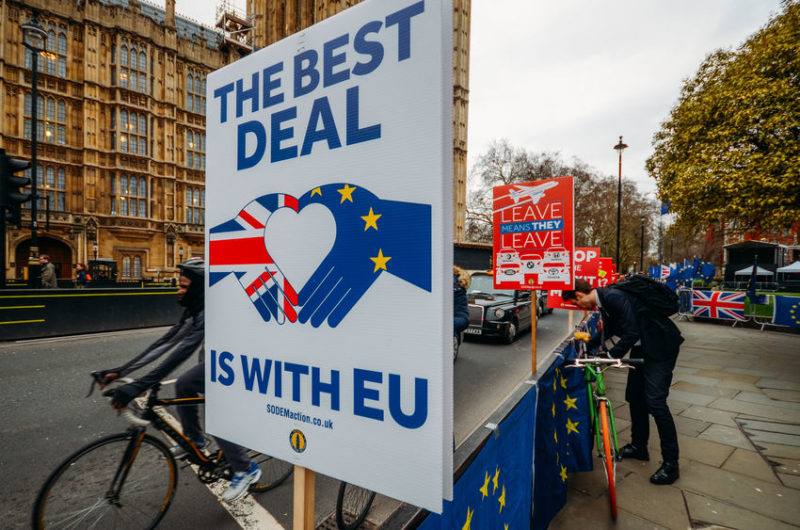
Ahead of the now confirmed December general election, what is going on in Britain that has paralysed its politics and led to a near-civil war amongst the political elite? An analysis by John Gloster-Smith, contributor to our cooperation partner Europa United.
One might very reasonably think that it’s about EU membership and a near complete and equal polarisation between Leave and Remain, but if one steps back to take an overview, there are also more fundamental issues about the British political system and political culture that can strike more detached observers.
The UK is entering its third general election in 4 years, called by PM Johnson to try to break the deadlock in Parliament and secure his deal just agreed with the EU and leave the EU on 31 January 2020. Attention naturally shifts to the offerings of the parties and who is likely to emerge the victor, the Leave side led by Johnson, or a mixed bag of opponents some of whom are Remain and one trying to appeal to both Leave and Remain. This is in a country that has become very fragmented in three and a half years of conflict over EU membership. The British political system is struggling to cope with such an upheaval.
Refusal to compromise
What might strike observers from other countries is how politicians at present seem unable to compromise on Brexit. It is of course partly an “either-or” question rather than one with various shades of grey. The Referendum of 2016 was on a simple Leave or Remain question, even though there was no thoroughly worked-through policy proposal, leaving various option for Brexit all of which had drawbacks, and thus producing plenty of scope for disagreement. Theresa May did negotiate a Withdrawal Agreement with the EU but Parliament rejected it. Various efforts however have since been made to find common ground in Parliament. In the summer of 2019 a series of “indicative votes” were held but no one option achieved a majority. Since then there have been attempts to push the customs union option, since it nearly had majority support, but this was in the end rejected.
After the Referendum, May attempted to pass her negotiated deal but when that failed and Johnson replaced her in 2019 he tried to force an alternative deal he had negotiated through Parliament. In the process he put severe strain on the workings of the British Constitution, most notably his attempt to use the deadline of 31 October and a prorogation of Parliament to try to limit debate, heighten fear by threatening a No Deal Brexit and thus achieve his objective. The Supreme Court ruled against him on the prorogation and Parliament took control and passed the Benn Act to force him to obtain an extension to Brexit.
Having failed to get his way with Parliament he has successfully cajoled it into agreeing to a general election to gain a majority and be able to pass his deal and leave the EU on 31 January 2020. This tactic might or might not work, depending on whether he wins an overall majority and the new Parliament will cooperate. It is at present a big “if”.
What should strike the detached observer is that neither May nor Johnson have built coalitions on which to secure their policy proposal and be able to legislate for it. Indeed, Johnson is content to blame Parliament for the failure and dub his election campaign as a populist one, “The People versus the Politicians”, again undermining the political system further.
The “winner takes all” system
The British political culture is accustomed to a “winner takes all” approach to politics, unlike in many other European countries. It is accustomed to there being two major parties, currently Conservative (“Tory”) and Labour, who compete in elections to win a majority and form a government without needing support from other parties. There are traditionally “minor” parties, since the War the Liberal or now Liberal Democratic Party (LDP), usually squeezed by the two dominant parties but acting as a “protest vote” outlet in by-elections.
There have, until 2010, been few periods when neither party had a majority. Since World War Two, for example, there was a minority or coalition government only in 1974. Since 2010 it’s been different. There was a coalition in 2010-2015, a small Tory majority from 2015 to 2017, and after May lost the 2017 election there was a period of minority government with, until 2019, a “confidence and supply” agreement for voting support from the Northern Irish DUP. Thus since 2010 the question has arisen as to whether the single majority party model was still viable.
The “winner takes all” approach has been reinforced by the electoral system, which has a bias against minor parties and emphasises the size of winning parties. This system is a simple majority or “first past the post” (FPTP) system where, in single member constituencies, the candidate who has most votes wins.
Moreover, all is not helped by the layout of the ancient House of Commons, with two opposing rows of seats facing each other. Contrast this with, say, the Welsh Assembly or Senedd. Famously, or infamously, the gap between the front rows of the two sides is that of “two swords and one inch” apart, reflecting an earlier age of a way of relating to one another. Arguably, this facilitates an adversarial behaviour. One has only to watch debates on parliamentlive to see how MPs address and treat each other.
This system was much lauded for producing majorities and thus “stable government”, until it ceased to do so.
An age of multiparty politics
Arguably Britain now has a multiparty situation trying to operate within a two-party model.
For some times parties have won elections on a shrinking share of the vote, exposing the ethical problem of the FPTP system. Less voters are supporting the “main” parties. Tony Blair won a majority in 2005 with 355 seats but a 35.2% share of the vote, while the third-placed LDP had 62 seats on 22%.
Minor parties were starting to erode the major party share. By 2015, when Cameron managed a small majority, a further complication was the rise of the Scottish National Party (SNP) who effectively replaced Labour in Scotland. Thus the Tories had 330 seats on 36.9%, while the SNP had 56 seats, while the LDP who fared badly after the 2010-2015 coalition had 8 seats. A further complicating factor has been the rise of the populist UKIP under Nigel Farage, now replaced by the Brexit Party under his leadership. While UKIP and BP haven’t so far won seats, UKIP’s share of votes in 2015 was 12.6%, and the BP was the largest party in the 2019 European Parliament Elections. The May government (2017-2019) had to rely on the DUP and its 10 seats to be able to govern.
The problem of the Westminster political culture
Thus the two-party system as a basis for forming governments looks to be in serious trouble. However, in terms of how politicians behave, they still seem to live in a past era and lack the skills and willingness to form alliances and negotiate coalitions, with the exception of the Tory-LDP 2010-2015 coalition which operated on a negotiated agreement very successfully. Johnson in particular, despite being a minority administration seems to have behaved as if he was at the head of a majority. Theresa May, throughout a poor communicator, fatally neglected to reach out to other parties until too late, when arguably this might have helped her face down her right-wing ERG faction who were undermining her.
Even now, as the 2019 general election gets under way, politicians are still talking as if there will be no compromise. Either they will have their majority, or function as a minority, and failing that call yet another election. Johnson seems by implication to reject Parliament and claims the dubious right to speak for “the people”.
Will the stalemate be resolved?
The use of a referendum to address an issue that was dividing the Tories and thus impose on the political system a plebiscitary model in competition with a representative one admittedly hasn’t helped. Thus claiming a prior right for popular sovereignty in a system which historically hasn’t functioned this way, especially without a clear, developed proposition, has driven a horse and cart through the political system, already struggling under the breakdown of the two-party model
We now have a further attempt to find legitimacy for a policy proposal, via the device of a general election, but should a majority not be gained, the systemic breakdown will continue, only to be joined by likely referendums in Scotland and perhaps Northern Ireland as the UK potentially starts to break up under the pressure.
Many say that a new political system is needed for the UK, one based on resolving its nationalities and regional questions, a change in the electoral system and a written constitution among other suggestions. However, while the country is so split over the major issue of Brexit and politicians continue to operate out of an outmoded political model and culture, it is not easy to see a stable, peaceful, and unifying way forward. Moreover, even if Brexit happens early next year, the complexities of the negotiations over a Trade Treaty will continue to divert and drain energy and the willingness to collaborate, unless some major shift occurs.
John Gloster-Smith is a graduate of Oxford University, a former Director of History and Politics at Mill Hill School, London, and a facilitator and coach in professional and personal development, working often at the heart of UK government. He is now largely retired, lives in South-west France and writes on politics and personal development. The text appears first on John’s blog https://revisioningpolitics.org and with our cooperation partner Europa United.



